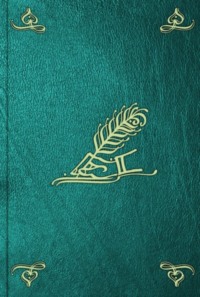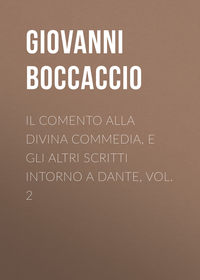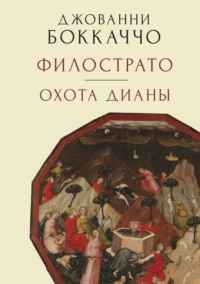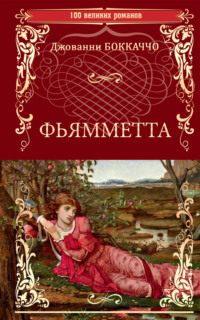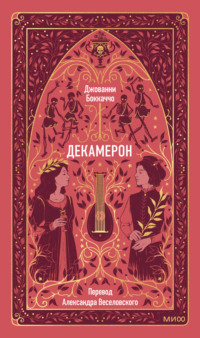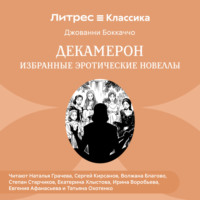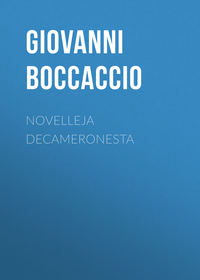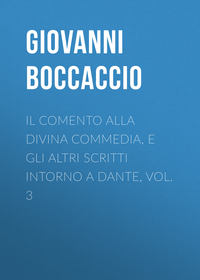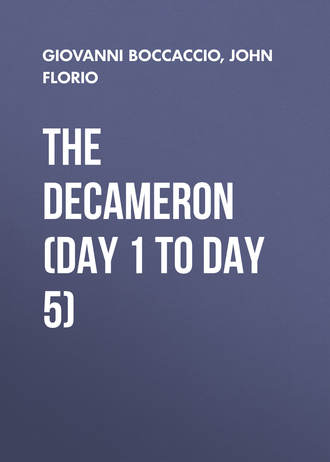 полная версия
полная версияThe Decameron (Day 1 to Day 5)
Secretly she sent a faithfull Chamber-maide of her owne, to greete Anastasio on her behalfe; humbly entreating him to come see her: because now she was absolutely determined, to give him satisfaction in all which (with honour) he could request of her. Whereto Anastasio answered, that he accepted her message thankfully, and desired no other favour at her hand, but that which stood with her owne offer, namely, to be his Wife in honourable marriage. The Maide knowing sufficiently, that hee could not be more desirous of the match, then her Mistresse shewed her selfe to be, made answere in her name, that this motion would bee most welcome to her.
Heereupon, the Gentlewoman her selfe, became the solicitour to her Father and Mother, telling them plainly, that she was willing to bee the Wife of Anastasio: which newes did so highly content them, that uppon the Sunday next following, the mariage was very worthily sollemnized, and they lived and loved together very kindly. Thus the divine bounty, out of the malignant enemies secret machinations, can cause good effects to arise and succeede. For, from this conceite of fearfull imagination in her, not onely happened this long desired conversion, of a Maide so obstinately scornfull and proud: but likewise al the women of Ravenna (being admonished by her example) grew afterward more kinde and tractable to mens honest motions, then ever they shewed themselves before. And let me make some use hereof (faire Ladies) to you, not to stand over-nicely conceited of your beauty and good parts, when men (growing enamored of you by them) solicite you with their best and humblest services. Remember then this disdainfull Gentlewoman, but more especially her, who being the death of so kinde a Lover, was therefore condemned to perpetuall punishment, and hee made the minister thereof, whom she had cast off with coy disdaine, from which I wish your minds to be as free, as mine is ready to do you any acceptable service.
Frederigo, of the Alberighi Family, loved a Gentlewoman, and was not requited with like love againe. By bountifull expences, and over liberall invitations, he wasted and consumed all his lands and goods, having nothing left him, but a Hawke or Faulcon. His unkinde Mistresse happeneth to come visite him, and he not having any other foode for her dinner; made a daintie dish of his Faulcone for her to feede on. Being conquered by this his exceeding kinde courtesie, she changed her former hatred towardes him, accepting him as her Husband in marriage, and made him a man of wealthy possessionsThe ninth Novell
Wherein is figured to the life, the notable kindnesse and courtesie, of a true and constant Lover: As also the magnanimous minde of a famous LadyMadame Philomena having finished her discourse, the Queene perceiving, that her turne was the next, in regard of the priviledge granted to Dioneus; with a smiling countenance thus she spake. Now or never am I to maintaine the order which was instituted when we beganne this commendable exercise, whereto I yeeld with all humble obedience. And (worthy Ladies) I am to acquaint you with a Novell, in some sort answerable to the precedent, not onely to let you know, how powerfully your kindnesses do prevaile, in such as have a free and gentle soule: but also to advise you, in being bountifull, where vertue doth justly challenge it. And evermore, let your favours shine on worthy deservers, without the direction of chaunce or Fortune, who never bestoweth any gift by discretion; but rashly without consideration, even to the first she blindly meets withall.
You are to understand then, that Coppo di Borghese Domenichi, who was of our owne City, and perhaps (as yet) his name remaineth in great and reverend authority, now in these dayes of ours, as well deserving eternal memory; yet more for his vertues and commendable qualities, then any boast of Nobility from his predecessors. This man, being well entred into yeares, and drawing towards the finishing of his dayes; it was his only delight and felicity, in conversation among his neighbours, to talke of matters concerning antiquity, and some other things within compasse of his owne knowledge: which he would deliver in such singular order, (having an absolute memory) and with the best Language, as verie few or none could do the like. Among the multiplicity of his queint discourses, I remember he told us, that sometime there lived in Florence a yong Gentleman, named Frederigo, Sonne to Signior Philippo Alberigho, who was held and reputed, both for Armes, and all other actions beseeming a Gentleman, hardly to have his equall through all Tuscany.
This Frederigo (as it is no rare matter in yong Gentlemen) became enamored of a Gentlewoman, named Madam Giana, who was esteemed (in her time) to be the fairest and most gracious Lady in all Florence. In which respect, and to reach the height of his desire, he made many sumptuous Feasts and Banquets, Joustes, Tiltes, Tournaments, and all other noble actions of Armes, beside, sending her infinite rich and costly presents, making spare of nothing, but lashing all out in lavish expence. Notwithstanding, shee being no lesse honest then faire, made no reckoning of whatsoever he did for her sake, or the least respect of his owne person. So that Frederigo, spending thus daily more, then his meanes and ability could maintaine, and no supplies any way redounding to him, or his faculties (as very easily they might) diminished in such sort, that he became so poore; as he had nothing left him, but a small poore Farme to live upon, the silly revenewes whereof were so meane, as scarcely allowed him meat and drinke; yet had he a Faire Hawke or Faulcon, hardly any where to be fellowed, so expeditious and sure she was of flight. His low ebbe and poverty, no way quailing his love to the Lady, but rather setting a keener edge thereon; he saw the City life could no longer containe him, where most he coveted to abide: and therefore, betooke himselfe to his poore Countrey Farme, to let his Faulcon get him his dinner and supper, patiently supporting his penurious estate, without suite or meanes making to one, for helpe or reliefe in any such necessity.
While thus he continued in this extremity, it came to passe, that the Husband to Madam Giana fell sicke, and his debility of body being such, as little, or no hope of life remained: he made his last will and testament, ordaining thereby, that his Sonne (already growne to indifferent stature) should be heire to all his Lands and riches, wherein hee abounded very greatly. Next unto him, if he chanced to die without a lawfull heire, hee substituted his Wife, whom most dearely he affected, and so departed out of this life. Madam Giana being thus left a widow; as commonly it is the custome of our City Dames, during the Summer season, shee went to a House of her owne in the Countrey, which was somewhat neere to poore Frederigoes Farme, and where he lived in such an honest kind of contented poverty.
Hereupon, the young Gentleman her Sonne, taking great delight in Hounds and Hawkes; grew into familiarity with poore Frederigo, and having seene many faire flights of his Faulcon, they pleased him so extraordinarily, that he earnestly desired to enjoy her as his owne; yet durst not move the motion for her, because he saw how choycely Frederigo esteemed her. Within a short while after, the young Gentleman, became very sicke, whereat his Mother greeved exceedingly, (as having no more but he, and therefore loved him the more entirely) never parting from him either night or day, comforting him so kindly as shee could, and demanding, if he had a desire to any thing, willing him to reveale it, and assuring him withall, that (if it were within the compasse of possibility) he should have it. The youth hearing how many times shee had made him these offers, and with such vehement protestations of performance, at last thus spake.
Mother (quoth he) if you can doe so much for me, as that I may have Frederigoes Faulcon, I am perswaded, that my sicknesse soone will cease. The Lady hearing this, sate some short while musing to her selfe, and began to consider, what shee might best doe to compasse her Sonnes desire: for well shee knew, how long a time Frederigo had most lovingly kept it, not suffering it ever to be out of his sight. Moreover, shee remembred, how earnest in affection he had beene to her, never thinking himselfe happy, but onely when he was in her company; wherefore, shee entred into this private consultation with her owne thoughts. Shall I send, or goe my selfe in person, to request the Faulcon of him, it being the best that ever flew? It is his onely Jewell of delight, and that taken from him, no longer can he wish to live in this World. How farre then voide of understanding shall I shew my selfe, to rob a Gentleman of his sole felicity, having no other joy or comfort left him? These and the like considerations, wheeled about her troubled braine, onely in tender care and love to her Sonne, perswading her selfe assuredly, that the Faulcon were her own, if shee would but request it: yet not knowing whereon it were best to resolve, shee returned no answer to her Sonne, but sate still in her silent meditations. At the length, love to the youth, so prevailed with her, that she concluded on his contentation, and (come of it what could) shee would not send for it; but goe her selfe in person to request it, and then returne home againe with it, whereupon thus she spake. Sonne, comfort thy selfe, and let languishing thoughts no longer offend thee: for here I promise thee, that the first thing I doe to morrow morning, shall be my journey for the Faulcon, and assure thy selfe, that I will bring it with me. Whereat the youth was so joyed, that he imagined, his sicknesse began instantly a little to leave him, and promised him a speedy recovery.
Somewhat early the next morning, the Lady, in care of her sicke Sons health, was up and ready betimes, and taking another Gentlewoman with her; onely as a mornings recreation, shee walked to Frederigoes poore Countrey Farme, knowing that it would not a little glad him to see her. At the time of her arrivall there, he was (by chance) in a silly Garden, on the backe-side of his House, because (as yet) it was no convenient time for flight: but when he heard, that Madam Giana, was come thither, and desired to have some conference with him; as one almost confounded with admiration, in all haste he ran to her, and saluted her with most humble reverence. Shee in all modest and gracious manner, requited him with the like salutations, thus speaking to him. Signior Frederigo, your owne best wishes befriend you, I am now come hither, to recompence some part of your passed travailes, which heretofore you pretended to suffer for my sake, when your love was more to me, then did well become you to offer, or my selfe to accept. And such is the nature of my recompence, that I make my selfe your guest, and meane this day to dine with you, as also this Gentlewoman, making no doubt of our welcome: whereto, with lowly reverence, thus he replyed.
Madam, I doe not remember, that ever I sustained any losse or hinderance by you, but rather so much good, as if I was woorth any thing, it proceeded from your great deservings, and by the service in which I did stand engaged to you. But my present happinesse can no way bee equalled, derived from your super-abounding gracious favour, and more then common course of kindnesse, vouchsafing (of your owne liberal nature) to come and visit so poore a servant. Oh that I had as much to spend againe, as heeretofore riotously I have run thorow: what a welcome wold your poore Host bestow upon you, for gracing this homely house with your divine presence? With these wordes, hee conducted her into his house, and then into his simple Garden, where having no convenient company for her, he saide. Madam, the poverty of this place is such, that it affoordeth none fit for your conversation: this poore woman, wife to an honest Husbandman will attend on you, while I (with some speede) shall make ready dinner.
Poore Frederigo, although his necessity was extreame, and his greefe great, remembring his former inordinate expences, a moity whereof would now have stood him in some sted; yet hee had a heart as free and forward as ever, not a jotte dejected in his minde, though utterly overthrowne by Fortune. Alas! how was his good soule afflicted, that he had nothing wherewith to honour his Lady? Up and downe he runnes, one while this way, then againe another, exclaiming on his disastrous Fate, like a man enraged, or bereft of senses: for he had not one peny of mony neither pawne or pledge, wherewith to procure any. The time hasted on, and he would gladly (though in meane measure) expresse his honourable respect of the Lady. To begge of any, his nature denied it, and to borrow he could not, because his neighbours were all as needie as himselfe.
At last, looking round about, and seeing his Faulcon standing on her pearch, which he felt to be very plumpe and fat, being voide of all other helpes in his neede, and thinking her to be a Fowle meete for so Noble a Lady to feede on: without any further demurring or delay, he pluckt off her necke, and caused the poore woman presently to pull her Feathers: which being done, he put her on the spit, and in short time she was daintily roasted. Himselfe covered the table, set bread and salt on, and laid the Napkins, whereof he had but a few left him. Going then with chearfull lookes into the Garden, telling the Lady that dinner was ready, and nothing now wanted, but her presence. Shee, and the Gentlewoman went in, and being seated at the table, not knowing what they fed on, the Falcon was all their foode; and Frederigo not a little joyfull, that his credite was so well saved. When they were risen from the table, and had spent some small time in familiar conference: the Lady thought it fitte, to acquaint him with the reason of her comming thither, and therefore (in very kinde manner) thus began.
Frederigo, if you do yet remember your former carriage towards me, as also my many modest and chaste denials, which (perhaps) you thought to favour of a harsh, cruell, and un-womanly nature: I make no doubt, but you will wonder at my present presumption, when you understande the occasion, which expressely mooved me to come hither. But if you were possessed of children, or ever had any, whereby you might comprehend what love (in nature) is due unto them: then I durst assure my self, that you would partly hold mee excused.
Now, in regard that you never had any, and I my selfe (for my part) have but onely one, I stand not exempted from those Lawes, which are in common to other mothers. And being compelled to obey the power of those Lawes; contrary to mine owne will, and those duties which reason ought to maintaine: I am to request such a gift of you, which I am certaine, that you do make most precious account of, as in manly equity you can do no lesse. For, Fortune hath bin so extreamly adverse to you, that she hath robbed you of all other pleasures, allowing you no comfort or delight, but onely that poore one, which is your faire Faulcone. Of which Bird, my Sonne is become so straungely desirous, as, if I doe not bring it to him at my comming home; I feare so much the extreamity of his sicknesse, as nothing can ensue thereon, but his losse of life. Wherefore I beseech you, not in regard of the love you have born me, for thereby you stand no way obliged: but in your owne true gentle nature (the which hath alwayes declared it selfe ready in you, to do more kinde offices generally, then any other Gentleman that I know) you will be pleased to give her me, or at the least, let me buy her of you. Which if you do, I shall freely then confesse, that onely by your meanes, my Sonnes life is saved, and wee both shall for ever remaine engaged to you.
When Frederigo had heard the Ladies request, which was now quite out of his power to graunt, because it had bene her service at dinner: he stood like a man meerely dulled in his sences, the teares trickling amaine downe his cheekes: and he not able to utter one word. Which shee perceiving, began to conjecture immediately, that these teares and passions proceeded rather from greefe of minde, as being loather to part with his Faulcon, then any other kinde of matter: which made her readie to say, that she would not have it. Neverthelesse shee did not speake, but rather tarried to attend his answer. Which, after some small respite and pawse, he returned in this manner.
Madame, since the houre, when first mine affection became soly devoted to your service; Fortune hath bene crosse and contrary to mee, in many occasions, as justly, and in good reason I may complain of her. Yet all seemed light and easie to be indured, in comparison of her present malicious contradiction, to my utter overthrow, and perpetuall molestation. Considering, that you are come hither to my poore house, which (while I was rich and able) you would not so much as vouchsafe to look on. And now you have requested a small matter of mee, wherein shee hath also most crookedly thwarted me, because she hath disabled mee, in bestowing so meane a gift, as your selfe will confesse, when it shall be related to you in very few words.
So soone as I heard, that it was your gracious pleasure to dine with me, having regard to your excellency, and what (by merit) is justly due unto you: I thought it a part of my bounden dutie, to entertaine you with such exquisite viands, as my poore power could any way compas, and farre beyond respect or welcome, to other common and ordinarie persons. Whereupon, remembring my Faulcon, which nowe you aske for; and her goodnesse, excelling all other of her kinde; I supposed, that she would make a dainty dish for your dyet, and having drest hir, so well as I could devise to do: you have fed hartily on her, and I am proud that I have so well bestowne her. But perceiving now, that you would have her for your sicke Sonne; it is no meane affliction to mee, that I am disabled of yeelding you contentment, which all my lifetime I have desired to doe.
To approve his words, the feathers, feete, and beake were brought in, which when she saw, she greatly blamed him for killing so rare a Falcon, to content the appetite of any woman whatsoever. Yet she commended his height of spirit, which poverty had no power to abase. Lastly, her hopes being frustrate for enjoying the Faulcon, and fearing besides the health of her Sonne: she thanked Frederigo for his honourable kindnesse, returning home againe sad and melancholly. Shortly after, her sonne either greeving that he could not have the Faulcone, or by extreamity of his disease, chanced to dye, leaving his mother a most wofull Lady.
After so much time was expired, as conveniently might agree with sorrow and mourning; her Brethren made many motions to her, to joyne her selfe in marriage againe, because she was extraordinarily rich, and as yet but yong in yeares. Now, although she was well contented never to be married any more; yet being continually importuned by them, and remembring the honourable honesty of Frederigo, his last poore, yet magnificent dinner, in killing his Faulcone for her sake, shee saide to her Brethren. This kinde of widdowed estate doth like me so well, as willingly I would never leave it: but seeing you are so earnest for my second marriage, let me plainly tell you, that I will never accept of any other husband, but onely Frederigo di Alberino.
Her brethren in scornfull manner reprooved her, telling her, that hee was a begger, and had nothing left to keepe him in the world. I knowe it well (quoth she) and am heartily sorry for it. But give me a man that hath neede of wealth, rather then wealth that hath neede of a man. The Brethren hearing how shee stoode addicted, and knowing Frederigo to bee a worthy Gentleman, though poverty had disgraced him in the Worlde: consented thereto, so she bestowed her selfe and her riches on him. He on the other side, having so noble a Lady to his Wife, and the same whome he had so long and deerely loved: submitted all his fairest Fortunes unto her, became a better husband (for the world) then before, and they lived and loved together in equall joy and happinesse.
Pedro di Vinciolo went to sup at a friends House in the City. His Wife (in the meane while) had a young man (whom shee loved) at supper with her. Pedro returning whom upon a sudden, the young man was hidden under a Coope for Hennes. Pedro, in excuse of his so soone comming home, declareth, how in the House of Herculano (with whom he should have supt) a friend of his Wives was found, which was the reason of the Suppers breaking off. Pedroes Wife reproving the error of Herculanoes Wife; An Asse (by chance) treads on the young mans fingers, that lay hidden under the Hen-Coope. Uppon his crying out, Pedro steppeth thither, sees him, knowes him, and findeth the fallacy of his Wife: with whom (neverthelesse) he groweth to agreement, in regard of some imperfections in himselfeThe tenth Novell
Reprehending the cunning shifts, of light headed and immodest Women, who, by abusing themselves, doe throw evill aspersions on all the SexeThe Queenes Novell being ended, and all the company applauding the happy fortune of Frederigo, as also the noble nature of Madam Giana: Dioneus, who never expected any command, prepairing to deliver his discourse, began in this manner. I know not, whether I should terme it a vice accidental, and ensuing through the badnesse of complexions uppon us mortals; or else an error in Nature, to joy and smile rather at lewd accidents, then at deeds that justly deserve commendation, especially, when they doe not any way concerne our selves. Now, in regard that all the paines I have hitherto taken, and am also to undergoe at this present, aymeth at no other end, but onely to purge your mindes of melancholly, and entertaine the time with mirthful matter: pardon me I pray you (faire Ladies) if my Tale trip in some part, and favour a little of immodesty; yet in hearing it, you may observe the same course, as you doe in pleasing and delightfull Gardens, plucke a sweete Rose, and yet preserve your fingers from pricking. Which very easily you may doe, wincking at the imperfections of a foolish man, and smiling at the amorous subtilties of his Wife, compassionating the misfortune of others, where urgent necessity doth require it.
There dwelt (not long since) in Perugia, a wealthy man, named Pedro di Vinciolo, who (perhaps) more to deceive some other, and restraine an evill opinion, which the Perugians had conceived of him, in matter no way beseeming a man, then any beauty or good feature remaining in the woman, entred into the estate of marriage. And Fortune was so conforme to him in his election, that the woman whom he had made his wife, had a young, lusty, and well enabled body, a red hairde wench, hot and fiery spirited, standing more in neede of three Husbands, then he, who could not any way well content one Wife, because his minde ran more on his money, then those offices and duties belonging to wed-lock, which time acquainting his Wife withall, contrary to her owne expectation, and those delights which the estate of marriage afforded, knowing her selfe also to be of a sprightly disposition, and not to be easily tamed by houshold cares and attendances; shee waxed weary of her Husbands unkind courses, upbraided him daily with harsh speeches, making his owne home meerely as a hell to him.
When shee saw that this domesticke disquietnesse returned her no benefit, but rather tended to her owne consumption, then any amendment in her miserable Husband; shee began thus to conferre with her private thoughts. This Husband of mine liveth with me, as if he were no Husband, or I his Wife; the marriage bed, which should be a comfort to us both, seemeth hatefull to him, and as little pleasing to me, because his minde is on his money, his head busied with worldly cogitations, and early and late in his counting-house, admitting no familiar conversation with me. Why should not I be as respectlesse of him, as he declares himselfe to be of me? I tooke him for an Husband, brought him a good and sufficient dowry, thinking him to be a man, and affected a woman as a man ought to doe, else he had never beene any Husband of mine. If he be a Woman hater, why did he make choyce of me to be his Wife? If I had not intended to be of the World, I could have coopt my selfe up in a Cloyster, and shorne my selfe a Nunne, but that I was not borne to such severity of life. My youth shall be blasted with age, before I can truly understand what youth is, and I shall be branded with the disgracefull word barrennesse, knowing my selfe meete and able to be a Mother, were my Husband but worthy the name of a Father, or expected issue and posterity, to leave our memoriall to after times in our race, as all our predecessours formerly have done, and for which mariage was chiefly instituted. Castles long besieged, doe yeeld at the last, and women wronged by their owne Husbands, can hardly warrant their owne frailty, especially living among so many temptations, which flesh and bloud are not alwayes able to resist. Well, I meane to be advised in this case, before I will hazard my honest reputation, either to suspition or scandall, then which, no woman can have two heavier enemies, and very few there are that can escape them.


